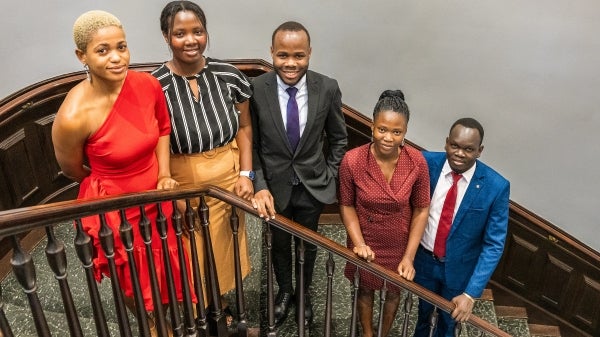Editor's note: This story is being highlighted in ASU Now's year in review. To read more top stories from 2017, click here.
A Phoenix couple whose business is based at Arizona State University scored a $150,000 investment from two judges on the TV show “Shark Tank” that aired Sunday night.
Maria Luna and Hector Rodriguez invented a payment and tipping app called Bravo and pitched it on the televised entrepreneurship competition, which is judged by a team of successful businesspeople.
Luna and Rodriguez, wearing black T-shirts with the Bravo logo, told the judges that the app, launched in 2015, is already processing more than a million dollars a month in transactions.
“Bravo is a seamless payment solution that allows you to find and pay anyone,” said Luna, the co-founder and CEO.
They were seeking a $150,000 investment in exchange for a 5 percent stake in their business. Three of the judges passed, but businessman Mark Cuban and inventor Lori Greiner agreed to invest if Luna and Rodriguez would increase the equity to 14 percent, which they did.
After the deal, Luna said the opportunity is “a dream come true.”
Luna told ASU Now after the show aired that the experience was fun and that what’s shown on the show is much shorter than what actually happens. The negotiation, for example, went on longer.
“It’s their job, they’re sharks, and it’s their right to negotiate,” she said.
“It was a very positive experience and will give us access to resources we didn’t have before.”
Even though their appearance on the popular TV show makes it seem like they’re an overnight success, Luna said it has taken years of hard work.
“It’s a lot of hours and a lot of ups and downs and having the capacity to adapt to that,” Luna said. “You have to be your own cheerleader.”
Rodriguez, who is a physician in addition to being the co-founder and COO of Bravo, said, “You need the ability to pick yourself up and reinvent yourself and move forward.”
Luna and Rodriguez, who are married, created an app called Bravo and are part of ASU’s Venture Devils program, which is in the office of Entrepreneurship + Innovation housed at SkySong in Scottsdale. Venture Devils provides space, mentorship and access to funding opportunities to entrepreneurs who are ASU students, faculty, staff or, like Bravo, community members.
“We have the shared space where we can have team meetings, and just being around other companies that are in our same stage as us is so inspiring,” Luna said. “You learn a lot from other companies that are going through the same pains. Just that environment alone is super helpful.
“ASU has one of the best accelerator community programs in the world, and for that we’re forever thankful.”
Bravo, which is GPS-based, works without exchanging personal information such as e-mail addresses or phone numbers. The app is designed to tip or pay artists, musicians, servers, valets, hairdressers or any small merchant. Users and business owners don’t need to be “friends,” and the app accepts 130 currencies. Bravo makes money by charging a 2 percent service fee to the payers, so someone who wants to give a tip of $10 actually pays $10.20.
Luna and Rodriguez got the idea for Bravo in 2014 when they were on a hiking trip in Utah and realized they didn’t have any cash to tip the guide. That made them realize that there was a niche in the market for workers in the service industry and small businesses who miss out on tips or payments because people no longer carry cash and don’t want to pay ATM fees.
Bravo won the “Wild Card” award at the TechCrunch San Francisco 2015 event and that prompted a producer from "Shark Tank" to invite the couple on the show.
On “Shark Tank,” Luna described how she grew up poor with a mother who worked in the service industry.
“My mother used to depend on those tips, and I know how much it hurts at home when there’s a week of poor tipping,” she told the judges.
Top photo: Hector Rodriguez and Maria Luna, whose business Bravo is part of Arizona State University's Venture Devils program, appeared on the "Shark Tank" entrepreneurship competition TV show on Sunday. Photo by Deanna Dent/ASU Now
More Business and entrepreneurship

Cohort of Mastercard Foundation Scholars poised to become AI leaders in Africa
Arizona State University is celebrating a significant milestone in expanding the university’s global access mission by welcoming the newest cohort of Mastercard Foundation Scholars, who will…

Networking event turns pitches into partnerships
Perfect timing, quick decisions and electrifying energy are vital aspects of both startup ventures and auctions. In an environment where every moment matters, everyone is searching for the deal that…

Thunderbird at ASU, W. P. Carey School team up on concurrent master's degrees
Students are now able to take advantage of two world-class schools at Arizona State University, at the same time. The Thunderbird School of Global Management and W. P. Carey School of Business…
